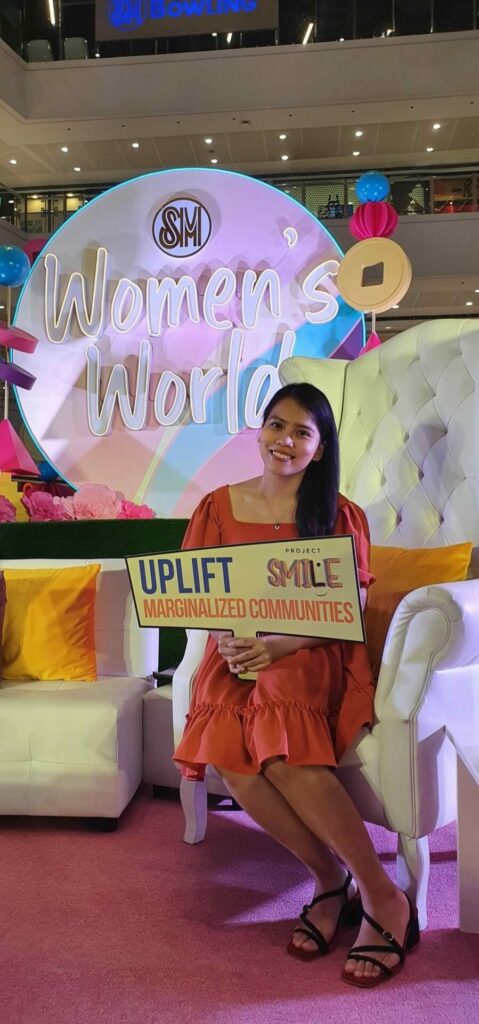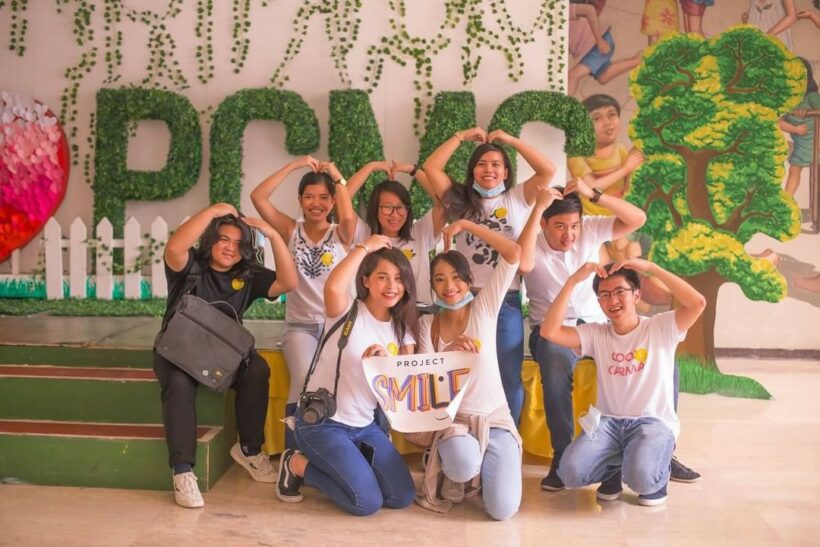Sabrina (Sam) Tamayo founded her non-profit, Project SMILE, in the Philippines in 2018. Her organization helps people of various ages and professions rise out of poverty and follows an inspiring mantra of starting small and building a reliable impact. In this interview she discusses human rights, the UN’s Sustainable Development Goals, and various aspects of life in the Philippines.
What would you say is the main difference between living in the UK and living in the Philippines?
I hope this doesn’t sound depressing, but if I had to use one word I’d describe living in the Philippines as precarious. There is a lot of uncertainty everywhere – from national affairs, the state of our sovereignty, and environmental issues. In our country, the poverty rates are high and inequality runs deep, but, on the contrary, the country is also very neo-liberal. We don’t have a lot of public spaces in our cities. Despite us being one of the most biodiverse places in the world, we don’t have a lot of parks and greeneries. And because of that, our way of spending time with family and our loved ones is monetized. So, the typical thing would be going to the malls. What I appreciated in the UK when I was studying [at University College London] and living there was the diversity of options. I didn’t necessarily have to spend [money] to have fun! I could spend hours outside in a park.
But, apart from having warmer weather, the Philippines’ advantage over the UK is our sense of community. The warmth of Filipinos is like no other. We have a term, Kapwa, which is somewhat similar to the African philosophy of Ubuntu. Ubuntu argues that “I am because we are”. Kapwa emphasizes the value of shared identity and being with others. And I think that keeps the Filipino people as united as possible.
How would you describe the general human rights situation in the Philippines, and the progress you are making as a country towards the UN’s Sustainable Development Goals?
Concerning human rights in the Philippines, I have to say that a lot of the progress we made has been erased by the previous administration. We had a war on drugs, but a lot of critics have argued that it was a war against the poor. Bloodshed became a common site. A lot of the dead bodies were equipped with placards that translated to: “Don’t be like me – I’m a drug addict.” As if these individuals deserved to die because they were “drug users”. I find it heartbreaking, and a lot of the images still haunt me, especially the families of the poor affected by this for whom it is a lived reality. They [the families] have to find a way to bounce back. There was also a theory that the police were hiring hitmen who were brainwashed into believing that they were contributing to a good cause and were tasked with killing these individuals.
On a more positive note, when it comes to the Sustainable Development Goals, I have to commend the government for becoming more proactive in this regard. We have an agency called the National Economic Development Authority, or NEDA, and they created a stakeholders’ chamber for the SDGs [Sustainable Development Goals]. Project SMILE has been fortunate enough to be one of the inaugural members of this committee. It [the committee] aims to foster partnerships and joint ventures to achieve SDG-related targets. We are encouraged to collaborate and to come up with projects that will advance the SDG goals.
What gave you the initial idea for Project SMILE, and how did you launch it as a non-profit?
I need to give some personal background for this. I studied for twelve years in an All-Girls catholic school. As you can imagine, it was very conservative and we were extremely sheltered. We had a lot of rules on dress, behaviour, and presentation. When I entered college, I decided to attend a state university here in the Philippines called University of the Philippines – Diliman. At that time, I shifted from a super sheltered environment to a more open one. I became exposed to a lot of social and political issues here. When you see things on television there is a distance, but when you encounter these issues on the street [they] become[ ] extremely personal. The university’s mantra was also to Serve the People – the people meaning the wider public. I wanted to really embody that mantra.
After graduation, when I was already earning my own money, I decided to start small. I would give food to people I encountered in the streets, whether that would be a street vendor, children, security guards, gasoline boys – whoever I chanced upon. I did that for about a year. In that very small gesture, I saw how their expressions changed as if they had won the lottery. For them, it was such a big deal. But for me, I was just giving them food, I wasn’t changing their lives. On a deeper level, I understood that they didn’t have to think about where they would get their food in that moment.
After doing that for about a year, I thought: hey, why don’t I level up? So, I thought of organising a Christmas party for a home for the aged, because I have a soft spot for the elderly. I talked to my friends and family about it, and I decided to send out emails to various companies, because I had nothing to lose. I managed to convince McDonald’s to sponsor this event. So, we spent an afternoon at the home for the aged. This gave me the feeling that such projects could have potential. I started Project SMILE formally in January 2018 and am very proud that, almost six years later, the organisation has grown beyond my wildest imagination. A lot of people want their projects to be an immediate success, and they get discouraged when they don’t manage to gather support from the get-go. My advice would be: why don’t you start small and see where it goes?
What are your current projects and campaigns with Project SMILE?
We have three campaigns. Under the first one, the Accessible Assistance Alliance, we connect therapists to families of children with disabilities so that they can receive quality therapy services. Under Hapag Kapwa, we are equipping fisherfolk with the tools and things they need for their livelihood. For Bridge the Golden Gap, is all about educating the wider public about the experiences of senior citizens and how technology could enable them to stay connected with their peers and reduce their loneliness. We work a lot with early-stage social impact start-ups. My professional background is in technology, and we work a lot with tech-driven organizations because I believe that it could be a good equalizer.
Why did you decide to work on these issues? Were they the most pressing ones around?
When it comes to choosing issues in the Philippines it can be quite overwhelming because there’s a lot that needs to be addressed. But since we are a youth-driven, volunteer-led organization, one of our core values is to have a democratic approach. We actively ask our volunteers and members for their opinions on what they want to address for that particular year. At the end of the day, we are all equal individuals, and I tried to embody that value as Executive Director.
Is COVID-19 still a big topic in the Philippines when it comes to development? Your website shows that a lot of your campaigns have been connected to COVID.
The Philippines had the longest lockdown in the world. It was only last year that we really started opening ourselves up again. In two years, from 2020 until early 2022, the general public was on the receiving end of a lot of confusing and often contradicting guidelines. At one point, despite being proven to not stop the spread of COVID-19, we were mandated to wear face shields whenever we went out, even though there was scientific evidence that it could contribute to even more cases. Only last year, restrictions were relaxed and people were allowed to go out freely again. But some still choose to wear facemasks, and I’d say rightly so, because of how unstable our healthcare system is. Only in the middle of last year, children were allowed to go to school again. They were just locked up in their homes until that point, trying to absorb information via digital platforms, and it had a negative effect not just on their academics but also on their ability to socialize. Unemployment has been reduced post-pandemic and inflation has also been lowered, but the country is still far from recovering from the impact of Covid. With the campaigns, we are trying to re-evaluate how we can align the objectives of the campaigns to the new needs that have arisen because of these new conditions.
Focusing on a different issue, some of your campaigns address helping people with disabilities, as well as children with disabilities. One of your campaigns focused on increasing access and employment possibilities, and Project SMILE stated that only 10-30% of employable people with disabilities find work. Why only such a small percentage?
There has been a lot of improvement, but the reality is that a lot of them still experience discrimination. In our #PeopleWith campaign, we aimed to uplift people and recognise them beyond their disabilities and connect them to opportunities. We had a focus group discussion. I can still vividly recall a story shared by one of our participants. He was a wheelchair user and he narrated how difficult it was for him to go from one place to another, not just because of his situation but because of limited transportation options. He said that a taxi driver even turned him away because he was in a wheelchair, because the driver claimed it would be an inconvenience or a hassle to accommodate him. This story inspired us to create the first PWD-driven and PWD-friendly tricycle. These negative perceptions in society also affect employability, but this has been proven wrong time and again.
Following up on your campaign that helps seaweed farmers: what is the situation of the agriculture sector in the Philippines? And more generally, which sectors are going through economic hardship now?
When it comes to agriculture and the fishing sector, it is really in a state of limbo. First, younger generations don’t want to be farmers or fishers anymore, because they are not paid well. Second, climate change is a big issue. The Philippines has one of the highest disaster risk levels in the world. These are projected to intensify as climate change worsens. Finally, we have an issue with our sovereignty. International courts, especially the UN Convention on the Law of the Sea have ruled in our favor, but our fishermen are still being threatened daily in the West Philippine Sea by Chinese vessels who make “historic” claims on the territory.
There is a power disparity because we are a small archipelagic nation in the Asia Pacific and we simply don’t have the resources of a country like the United Kingdom. We are unable to assert our rights. But at the end of the day, Filipinos are good at being “resilient”.
Sam Tamayo is also part of the 30 for 2030 Network of UN Women and works on SDG-related initiatives in affiliation with UN Women Asia and Pacific, the Chevening community, and the US Embassy in the Philippines.











